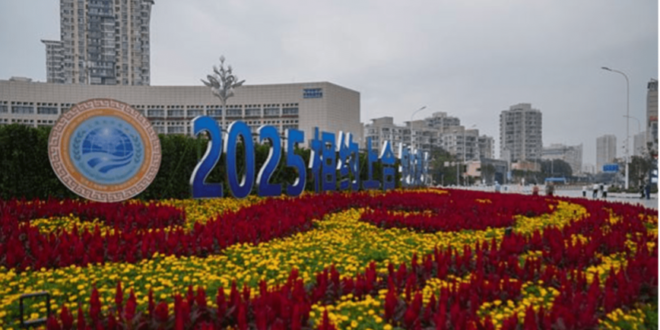Dimitra Staikou
Indian Prime Minister Narendra Modi’s presence at the Shanghai Cooperation Organization (SCO) Summit in Tianjin at the end of August underscores a shifting global order in which India is emerging not as a junior partner to China and Russia, but as a pivotal swing power. While Beijing and Moscow use the SCO as a platform to challenge Western influence, New Delhi has signaled—subtly but firmly—that it will chart its own independent path. For Europe, this creates a rare and fleeting opportunity: to lock in India as a partner through a comprehensive free trade agreement.
The SCO, once a narrow security forum aimed at combating terrorism and drug trafficking, has evolved into a geopolitical bloc with economic and military dimensions. Yet, India stands apart. Unlike China and Russia, whose actions often reinforce authoritarian practices and cyber aggression against the West, India’s participation is pragmatic and measured. Prime Minister Modi’s emphasis on “peace, stability, and cooperation” contrasts sharply with the aggressive multipolar rhetoric pushed by Xi Jinping and Vladimir Putin.
The EU must read this moment correctly. By stepping up engagement and accelerating FTA negotiations with India, Europe can secure access to the world’s fastest-growing major economy and reduce its dependence on China and Russia for supply chains, energy, and critical raw materials. Delay would be strategic folly.
India as a Bridge, Not a Pawn
India’s SCO membership gives it access to Central Asian resources, energy corridors, and alternative trade routes. But New Delhi does not share the same ideological agenda as Beijing and Moscow. Its balancing act—cooperating on regional security while maintaining dialogue with the West—makes India the ideal bridge for Europe into this emerging multipolar order.
An FTA would cement India’s economic partnership with the EU, ensuring that New Delhi does not tilt too heavily toward the East. For Europe, this is not just an economic calculation, but a national interest priority: preventing China and Russia from monopolizing influence in Asia’s geopolitical heartland.
Strategic Stakes for Europe
-
Economic Diversification: India offers Europe a massive alternative market to China, with a young population, expanding middle class, and strong demand for technology, energy, and green solutions.
-
Supply Chain Resilience: Partnering with India reduces Europe’s exposure to Chinese-dominated supply chains and Russian energy blackmail.
-
Geopolitical Leverage: A timely FTA signals to Washington, Tokyo, and Canberra that Europe is serious about the Indo-Pacific. The US, Japan, and Australia are already far ahead in structuring strategic frameworks with India. Brussels cannot remain a laggard.
-
Green and Digital Cooperation: India is central to the global climate transition and digital innovation race. Europe has the technology and capital to complement India’s scale and dynamism.
The Window Is Closing
Xi and Putin’s SCO messaging is clear: the world should prepare for a multipolar system designed to dilute Western leadership. Europe has a choice: either remain reactive to this shift or proactively align with India to shape it. An FTA would not simply be a trade pact—it would be a strategic anchor for Europe in the Indo-Pacific, safeguarding national and continental interests.
Conclusion
The EU–India free trade agreement is not a matter of tariffs and quotas. It is a geopolitical necessity. In a world where China weaponizes technology and Russia weaponizes energy, Europe must act decisively. India’s moment is now. Europe cannot afford to miss it.
Dimitra Staikou is a Greek lawyer, human rights advocate . She works as a journalist writing about human right's violations in South Asia and ctravels to India to get informed about the political situation there and the geopolitcs between India,China ,Pakistan and Bangladesh. She works for Greece's biggest newspaper Skai.gr and Huffpost.Gr as well as international distinguised news sites as Modern Diplomacy and Global Research.
 Geostrategic Media Political Commentary, Analysis, Security, Defense
Geostrategic Media Political Commentary, Analysis, Security, Defense





